Brian Clegg's Blog, page 47
November 29, 2016
The joy of physics in Exeter
 This is primarily to give a thank-you to those involved in organising the Festival of Physics in Exeter on Saturday. But also to reflect on what such an event does so well.
This is primarily to give a thank-you to those involved in organising the Festival of Physics in Exeter on Saturday. But also to reflect on what such an event does so well.In a recent editorial for the newsletter of the Popular Science book review site, I said:
I suspect you'll agree with me that science isn't boring - yet we've all got plenty of friends who turn off the moment that science is mentioned. I'd suggest that two of the reasons for this is that we teach science back to front, and we forget the importance of narrative.
When I talk at schools to children under 13 or so, they pretty well all love science. But something horrible happens after a couple of years at secondary school. It becomes a drag. I think this is because we teach secondary science with entirely the wrong result in mind. We teach it as if we are preparing them to be scientists. This means starting by building up the basics, step by step, in a systematic fashion. I'm almost asleep already. Of course this is essential for those who will study science at a higher level - and can be caught up in a couple of weeks by anyone who does. But it misses such a huge opportunity.
If, instead, we taught the interesting bits and the applications - real, modern science, not Victorian basics, far more of the students would stay interested. Of course they couldn't, for instance, do the maths required to handle the field equations of relativity - but there is no reason why we can't teach the concepts of the general theory and really grab their attention with everything from GPS to time machines.
That second aspect of narrative also ties into what the science education is for. If, like popular science, our science lessons gave context, talked about the people involved in the science and the history as well as the applications, there is far more opportunity for storytelling. And that's how people are wired to learn. Suddenly, the science becomes much more accessible.
I'm not saying it's a universal panacea. But if we taught science to give people the kind of interest and grasp that popular science readers have, rather than as trainee scientists, I think we could dismiss that 'boring' myth forever.I had a reader query whether this was really true - had I checked out a modern science curriculum? Surely it wasn't like this anymore? So I took a look at the AQA GCSE physics curriculum and, unfortunately there is still a fair amount of truth in my assertion. The requirements were very much about getting the basics of Victorian physics. Neither 'relativity' nor 'quantum' appeared anywhere in the document.
That means there's so much to be gained when a body like the Institute of Physics puts on event like Saturday's with lots of interesting material and fun topics for all ages. The audience was a brilliant mix from children through to pensioners - and I hope you will watch out for similar opportunities coming your way (there's apparently one in Bristol next March).
I don't know if we can change the nature of school science, because it's not about tweaking the curriculum, it's about a fundamental change in what school science education is for. And that could only come from government. But I do know that events like the Festival of Physics go a good way to countering any negatives that might emerge from the curriculum - so let's have even more!
Published on November 29, 2016 01:37
November 28, 2016
Till the Fat Lady's Sung review
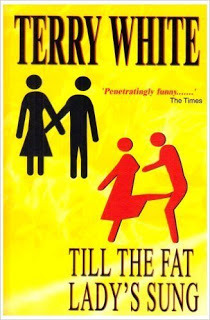 There's a strong traditional strand of British humorous writing where a male protagonist gets themselves into various scrapes as they attempt to take on the difficulties of social life - especially so when they don't quite fit. The outstanding examples of writers in this genre were Leslie Thomas, now well out of fashion, and Tom Sharpe, whose more extreme and grotesque versions of this type of situation comedy have perhaps survived better.
There's a strong traditional strand of British humorous writing where a male protagonist gets themselves into various scrapes as they attempt to take on the difficulties of social life - especially so when they don't quite fit. The outstanding examples of writers in this genre were Leslie Thomas, now well out of fashion, and Tom Sharpe, whose more extreme and grotesque versions of this type of situation comedy have perhaps survived better.Terry White has contributed several twenty-first century titles in the same vein. An early contribution, Till the Fat Lady's Sung (shouldn't that be 'Til?), finds his hero, Marcus Moon, struggling to balance his laddish existence with his banker-like and ludicrously heavy drinking mates, his job as a civil engineer and his life with a doctor, who he clearly loves, but for whom he struggles to have totally dedicated feelings.
Moon and his girlfriend Charlie are a bit too successful and normal for a typical Thomas/Sharpe main character, but the various characters that Moon meets with the potential to scupper his plans and his love life are very much from the comic grotesques tradition. Most significant is a power-mad extreme left-winger who sets out to take over a building preservation charity to add weight to a political campaign - in fact, we see part of the action from her viewpoint, which can be a little confusing when the switch is made back to the first person narrator Moon. Left-wing machinations are balanced by chinless inbred right-wingers and a totally bonkers sailor, who plays an unexpected part in the story. Another archetype of the genre is a dominant vicar's wife, who Moon first accidentally knocks off her bike and then appears to have dubious intentions when he is caught fiddling with his flies near her dogs.
Despite appearing to be self-published (more on that in a moment), the book was well proof-read, and White is an assured writer who knows how to use words. Even so, the lack of a formal editor was present, not in the technical writing, but in the way that the author was allowed to get away with being far too generous with those words. Moon's inner monologues sometimes go on for an age and every situation is too wordy. Part of the essence of this style is getting things to move on snappily, and that can't happen with so much thinking going on.
I would also say that the approach sometimes felt old-fashioned, both in the ingrained sexism of the male characters and some of the language used by Moon, which felt more like P. G. Wodehouse than a modern version of Sharpe. Despite that, though, I can't deny that I enjoyed the book, rattled through it quickly and am happy that I have a second (and somewhat slimmer) volume to move onto.
A quick comment on the publishing approach. This comes through in three points - the cover images are dreadful, the print is poor (every third spread is fine, but the rest are far too faint) and no one has told the author that the UK standard is single quotes, not double ones. However, these are all minor issues and don't get in the way of the reading. I got through the book mostly on the train and it's ideal fodder for that kind of a read. This isn't life-changing literature, but provided you can cope with that sexism, it is entertaining.
Till the Fat Lady's Sung is available from amazon.co.uk and amazon.com.
Published on November 28, 2016 02:11
November 17, 2016
Why do we let culture and religion overrule equality?
I am somewhat to the right politically of many of my online friends - this isn't entirely surprising as many of them are academics, where I have a business background. But that doesn't make me a conservative with a small C. In fact those fairly close to the centre of politics on either wing are probably least likely to suffer less from conservatism on the matter of equality versus culture and religion than those who sit firmly on one side or another. Right wing conservatives want to preserve their own culture, while left wing conservatives want to preserve everyone else's culture but their own, probably due to an existential guilt over the imperialist past.
However, I truly can't understand how we justify the way that we unthinkingly put religious and cultural demands above equality. Who decides which should have the upper hand? You can see why, in the past, when a particular religion had a huge hold on a country this might the case, but should that still apply in the 21st century?
So, for instance, do Catholics and Muslims really deserve the right not to allow female priests or imams? Is it acceptable that Church of England vicars won't perform same sex marriages? Note that to question this is not in any sense a matter of suppressing religion. I'm not saying that people shouldn't be religious or should be prevented from practicing a religious faith - just that it's not clear why following a religion gives you the right to overrule aspects of equality that are broadly accepted by society. We already limit many of the practices of religion (stoning adulterers, for example), so it's not clear why this particular aspect gets ignored - unless it's that the establishment is conservative with a small C.
This move to equality extends beyond religion to wider cultural applications too. Why should Masons, for example, be allowed to prevent women from joining their lodges? (Not that I can imagine many would want to join.) The only reason I can see that we allow culture and religion to have an override on equality is unconscious conservatism. And perhaps one good thing that could emerge from an era of political upheavals is that we can re-examine assumptions like this.
However, I truly can't understand how we justify the way that we unthinkingly put religious and cultural demands above equality. Who decides which should have the upper hand? You can see why, in the past, when a particular religion had a huge hold on a country this might the case, but should that still apply in the 21st century?
So, for instance, do Catholics and Muslims really deserve the right not to allow female priests or imams? Is it acceptable that Church of England vicars won't perform same sex marriages? Note that to question this is not in any sense a matter of suppressing religion. I'm not saying that people shouldn't be religious or should be prevented from practicing a religious faith - just that it's not clear why following a religion gives you the right to overrule aspects of equality that are broadly accepted by society. We already limit many of the practices of religion (stoning adulterers, for example), so it's not clear why this particular aspect gets ignored - unless it's that the establishment is conservative with a small C.
This move to equality extends beyond religion to wider cultural applications too. Why should Masons, for example, be allowed to prevent women from joining their lodges? (Not that I can imagine many would want to join.) The only reason I can see that we allow culture and religion to have an override on equality is unconscious conservatism. And perhaps one good thing that could emerge from an era of political upheavals is that we can re-examine assumptions like this.
Published on November 17, 2016 05:38
November 16, 2016
Review - Who Killed Sherlock Holmes?
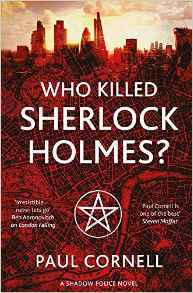 After reading two entries in Paul Cornell's 'Shadow Police' series, I couldn't resist moving on to the third within days of finishing the previous title. Who Killed Sherlock Holmes sustains the approach of its predecessors, mixing the fantastic, driven by the strange capability of London to capture and magnify human remembering (and sacrifice), with straightforward police procedural.
After reading two entries in Paul Cornell's 'Shadow Police' series, I couldn't resist moving on to the third within days of finishing the previous title. Who Killed Sherlock Holmes sustains the approach of its predecessors, mixing the fantastic, driven by the strange capability of London to capture and magnify human remembering (and sacrifice), with straightforward police procedural. By the end of the book the mix works very well, with a lot that has been left hanging from the previous two novels resolved - but along the way it was decidedly hard work. This is because most of the main characters are, for various reasons, miserable and suffering throughout the book. Although this certainly gives the characters challenges to face, it can result in rather dour reading material.
As Buffy the Vampire Slayer proved so well, by far the best way to deal with the apparently impossible challenge of integrating the fantastical and the everyday is through humour. And humour was behind a lot of the resilience of the characters and interest in the plot in the first book. But here, things are so bleak for so long that is hard to really enjoy the book until you make it to the last few chapters.
Even so, the resolution is well handled - and there is clearly a lot more to mine here, if Cornell chooses to do so. He has moved an interesting character from the sidelines into the spotlight, which bodes well for future books. As long as Cornell can keep the mood a little more variable in future titles, rather than keeping things so uniformly bleak, we can look back on Who Killed Sherlock Holmes as a necessary low point to work through and get on with enjoying the rest of what is still one of the best urban fantasy series of the moment.
Who Killed Sherlock Holmes is available from amazon.co.uk and amazon.com.
Published on November 16, 2016 01:23
November 15, 2016
Did an old advert ruin a classic song?
 When I was young, an unlikely product was regularly advertised on TV which some accused of ruining a great song. It was what we'd now primarily call kerosene - aviation fuel - but then was the more humble paraffin. But it wasn't because we all had private jets back then. If you were allowed to watch commercial TV (more conservative households considered ITV to be the work of the devil and stuck to the BBC) it would only take someone to sing four rising tones in a major key to the jaunty words 'Bum bum bum bum' (no, really) to come up with the response 'Esso Blue!'
When I was young, an unlikely product was regularly advertised on TV which some accused of ruining a great song. It was what we'd now primarily call kerosene - aviation fuel - but then was the more humble paraffin. But it wasn't because we all had private jets back then. If you were allowed to watch commercial TV (more conservative households considered ITV to be the work of the devil and stuck to the BBC) it would only take someone to sing four rising tones in a major key to the jaunty words 'Bum bum bum bum' (no, really) to come up with the response 'Esso Blue!'This wasn't, of course, the song in question, but more of that in a moment. Esso Blue was the leading brand of paraffin in the UK and it was bought in large quantities, because back then most of us didn't have central heating. (We got it when I was 11.) In the winter, a room or two were heated by open fires, you might have had an electric wall heater in the bathroom - but if you wanted heat elsewhere, you'd probably haul in the paraffin heater. These things sound deadly - presumably they put out all sorts of noxious substances - but we survived somehow.
However, Esso didn't limit themselves to the poetic drama of 'Bum bum bum bum' - they had another advertising trick up their sleeve which would provide an earworm to this day. They took the old classic 'Smoke gets in your eyes,' and subtly transformed the words for advertising purposes. For this reason, long before I knew it was an existing song, I could sing 'They asked me how I knew/It was Esso Blue./I of course replied/"With lower grades one buys*,/Smoke gets in your eyes."'
However, despite this, I have to answer 'No' to the question in this post's title. The advertisement didn't ruin a classic song - it merely brings back powerful memories many years later.
* They don't make adverts like they used to. When did you last here a non-ironic 'one' in an advert?
Published on November 15, 2016 01:42
November 14, 2016
Could Trump's election be the impetus we need to do something about climate change?
 Don't get me wrong - I'm no Trump supporter. But his anti-climate change stance could provide the pressure that's needed to get a meaningful plan put in place to tackle this pressing world problem.
Don't get me wrong - I'm no Trump supporter. But his anti-climate change stance could provide the pressure that's needed to get a meaningful plan put in place to tackle this pressing world problem.A while ago, a website labelled me a green heretic, by which they meant that I thought it essential we use science, technology and economics to tackle green issues, rather than relying on fluffy bunny, feel-good gestures. I was delighted. We need more green heresy - and I think Trump could be the stimulus to make this happen.
Climate change is real and a huge threat to the future population of the world - I'm sorry, deniers, but the science is solid, it's only the models dealing with how fast it will hurt us that are subject to question. It will be a disaster unless we do something about it. (I ought to say, though, that you needn't worry about saving the planet. The Earth itself will shrug whatever we do off in a few million years. It really doesn't care. This is about saving humanity.)
I'm afraid for all their meetings involving vast numbers flying around the world, the scientists and politicians trying to sort this out have not got the right balance. And worse, they don't understand people. We humans are capable of being aware that something is bad for us and still carrying on doing it. (Big Mac with a double espresso martini, anyone?) It's not enough to make scary predictions and agree to limit something you only have limited control over. We need to be investing more right now in two things. In energy sources that don't produce greenhouse gasses - both classic 'renewables' and nuclear - and in technology to actively reduce the temperature or take greenhouse gasses out of the atmosphere. At the moment, both of these essentials are underfunded.
It's a matter of pragmatism. Even without the Trump effect (I am not referring to farting cows), we will overshoot what we need to do. And now it could be even worse. So stop assuming it's enough to be scary and appeal to doing the right thing and start taking practical steps to mitigate it. That means more money for research. Not just from governments either. It's great that, for instance, Bill and Melinda Gates are putting so much into Malaria research. But this is an even bigger problem long term - and we should see some more billionaires shedding their billions for their children' sake.
This doesn't mean, by the way, that we can leave everything to other people and get on with our lives as usual. We should continue (or start) doing our collective bits - and I try to as much as the next person. I recycle, I've cut my domestic energy use to about 1/3 of what it was, I use public transport when I can and I've only flown once in the last 20 years (care to match me, academics?) We need this as well - but on its own it isn't enough.
So, while I don't deny that the election of President-elect Trump is liable to make things get worse faster, it may just be the wake-up call we need.
Published on November 14, 2016 03:56
November 11, 2016
If I only had...
In amongst the spam and oddities that appear in email there is occasionally an official one that causes some confusion - and I got such a mail today. It was from the DVLA, and as far as I can tell it was genuine. And it was advertising an auction of personalised car registrations.
Impressively, it was a personalised email, as it was suggesting my company might be interested in a specific numberplate. But the initials on the numberplate were ABR an my company initials are CUL - which seemed a pretty hefty miss. Then I realised that the targeting of the email was cleverer than I had thought. After all, the 'C' in the company's initials stands for 'creativity. I was supposed to read the whole numberplate, not just the first three letters. I don't was a personalised numberplates - I think they're tacky. But if I did, I would have got excited if I only had...

Impressively, it was a personalised email, as it was suggesting my company might be interested in a specific numberplate. But the initials on the numberplate were ABR an my company initials are CUL - which seemed a pretty hefty miss. Then I realised that the targeting of the email was cleverer than I had thought. After all, the 'C' in the company's initials stands for 'creativity. I was supposed to read the whole numberplate, not just the first three letters. I don't was a personalised numberplates - I think they're tacky. But if I did, I would have got excited if I only had...

Published on November 11, 2016 00:08
November 8, 2016
Review - The Severed Streets
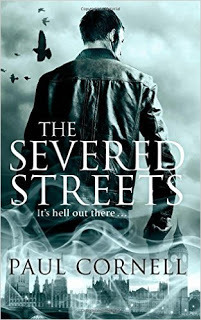 I was so impressed with Paul Cornell's
London Falling
, that I've had to buy and read the sequel, The Severed Streets within days - and it doesn't disappoint.
I was so impressed with Paul Cornell's
London Falling
, that I've had to buy and read the sequel, The Severed Streets within days - and it doesn't disappoint.In the first book, a motley crew of three police officers and an analyst discover the dark magic lying beneath London. This second 'Shadow Police' title (I'm not sure about that series name) takes them deeper into the weirdness that lies out of sight to most, as a series of rich men are slaughtered horribly with a razor. All this takes place alongside ant-capitalism riots and a police strike, leaving London a place that's best avoided.
In reviewing London Falling, I said:
imagine a combination of a modern version of The Devil Rides Out, a dark police procedural and a sprinkling of Neil Gaiman's Neverwhere and you might come closeHere were discover why that last comparison was particularly apt (I had no idea, honestly) - because Neil Gaiman is a character in this book and the suggestion is that the book version of Neverwhere was inspired by his experiences.
I ought to stress that this book is nothing like Neverwhere - it's much more gritty, without the comedy (though Cornell can't resist a Sweeney joke at one point), and tries to establish what a set of unconventional coppers would do faced with the discovery of an occult world.
There's some good character progression here from the first book. Three of the four main characters have experiences that enable us to see far more of their characters, while a fifth, mysterious character on their side is given a little more exposure. The situation the officers find themselves in is dire - it's difficult to see how they are going to survive this one and it is as much of a page turner as its predecessor.
I liked The Severed Streets very much, though I don't think it's quite as good as the original. This is because some of the subplots don't work quite as well, because the introduction of a real person like Gaiman feels wrong, and because the police inspector's experience in the second half sits uncomfortably with the style of the rest, shocking though it is. Nevertheless, this book cements Cornell as the UK's new master of this kind of urban fantasy... and I've already ordered volume 3.
The Severed Streets is available from amazon.co.uk and amazon.com.
Published on November 08, 2016 01:37
November 7, 2016
There's lies, damned lies and political pie charts
There's been a graphic doing the rounds which, according to the Independent 'Remain supporters are using to invalidate the decision to leave the EU.' It looks like this:
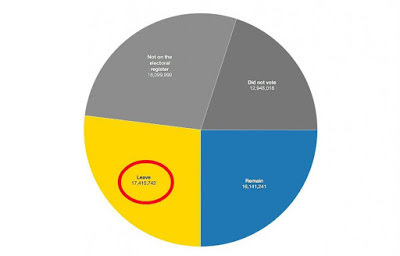 The yellow segment is the those who voted to leave. Look how small it is compared to the whole set of public who could, in principle have voted. (Blue is remain and the two grey bits are people who didn't register, and registered but didn't vote.) This is being taken as disproving the idea that Brexit is 'the will of the people' as worked up Brexiteers tend to blather, because it appears to be a minority decision.
The yellow segment is the those who voted to leave. Look how small it is compared to the whole set of public who could, in principle have voted. (Blue is remain and the two grey bits are people who didn't register, and registered but didn't vote.) This is being taken as disproving the idea that Brexit is 'the will of the people' as worked up Brexiteers tend to blather, because it appears to be a minority decision.
Unfortunately, those who use this chart simply don't understand the statistics that arise from a voting system like ours. You could never definitely say what the will of the people is for sure unless you force everyone to vote. Look at this chart below. Here the grey section is the equivalent of the yellow section above - it's the people who voted for the actual outcome. A far smaller slice.
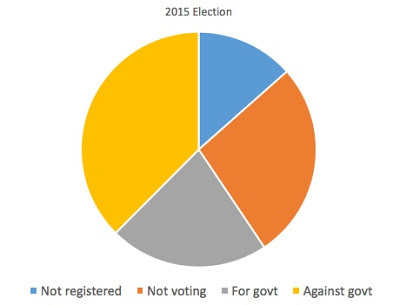
Terrible, isn't it? Clearly not democratic. Yet the grey section is the percentage of people voting for the government in the 2015 election.
The fact is that unless you do make it a legal requirement to vote, you have to assume that those who don't vote don't mind the outcome and can't be counted. It's the only possible sensible thing to do - and because of that, the way these pie charts are being used is manipulative and wrong. I don't mind you arguing for or against Brexit. Each has powerful arguments. But I do mind if you are going to misuse statistics.
 The yellow segment is the those who voted to leave. Look how small it is compared to the whole set of public who could, in principle have voted. (Blue is remain and the two grey bits are people who didn't register, and registered but didn't vote.) This is being taken as disproving the idea that Brexit is 'the will of the people' as worked up Brexiteers tend to blather, because it appears to be a minority decision.
The yellow segment is the those who voted to leave. Look how small it is compared to the whole set of public who could, in principle have voted. (Blue is remain and the two grey bits are people who didn't register, and registered but didn't vote.) This is being taken as disproving the idea that Brexit is 'the will of the people' as worked up Brexiteers tend to blather, because it appears to be a minority decision.Unfortunately, those who use this chart simply don't understand the statistics that arise from a voting system like ours. You could never definitely say what the will of the people is for sure unless you force everyone to vote. Look at this chart below. Here the grey section is the equivalent of the yellow section above - it's the people who voted for the actual outcome. A far smaller slice.

Terrible, isn't it? Clearly not democratic. Yet the grey section is the percentage of people voting for the government in the 2015 election.
The fact is that unless you do make it a legal requirement to vote, you have to assume that those who don't vote don't mind the outcome and can't be counted. It's the only possible sensible thing to do - and because of that, the way these pie charts are being used is manipulative and wrong. I don't mind you arguing for or against Brexit. Each has powerful arguments. But I do mind if you are going to misuse statistics.
Published on November 07, 2016 01:40
November 4, 2016
Get your shades on for my new book
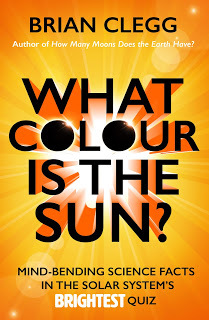 I'm really pleased I've been able to follow up my science quiz book How Many Moons does the Earth Have? with a second volume -
What Colour is the Sun?
It was just as much fun to write - and I hope equally enjoyable to read. What's more it's a great stocking filler - on Amazon at the moment it's just £5.49.
I'm really pleased I've been able to follow up my science quiz book How Many Moons does the Earth Have? with a second volume -
What Colour is the Sun?
It was just as much fun to write - and I hope equally enjoyable to read. What's more it's a great stocking filler - on Amazon at the moment it's just £5.49.Although it's not how most will use it, there are two pub quiz style science quizzes in there, each with six standard rounds and two bonus rounds, which combine pictorial and puzzle solving work. However, it's written to make reading through it fun. Each of the 96 main questions has the question plus some supporting factoids on one page and the answer, plus a page of further reading on the next. So you can test yourself on each question - then find out more.
These aren't the kind of question you'd get in a science exam (thankfully) - they're more the quirky kind of questions you get on QI, with the bonus that science is right more often. So you'll find out, for instance:
Why do hands and feet go wrinkly in the bath?What is a chiliagon?What is measured in slugs?Which scientific term is the most commonly used noun in written English?What would win in a fight between T. rex and Godzilla?Who can breath metals and still survive?… and many more, including, yes, What colour is the Sun? (which QI gets wrong).
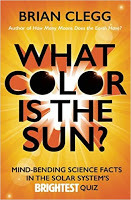
In case you are of the US persuasion, you'll be pleased to know that you don't have to suffer that weirdly spelled cover - you've got the more familiar spelling.
To give a feel for how the book works, here's one of the 'question' pages with its factoids:

... and here's the start of the answer page (there's more):
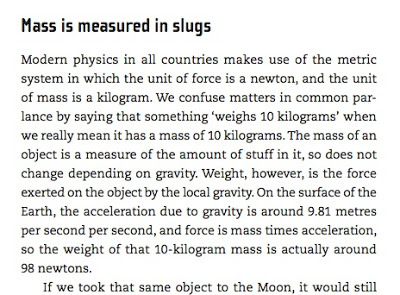
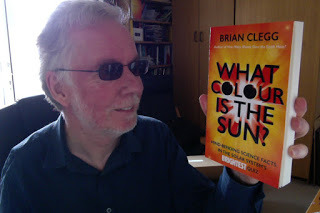 To find out more or buy in either paperback or ebook form, just pop over to the book's web page.
To find out more or buy in either paperback or ebook form, just pop over to the book's web page.Warning. Shades may be needed to cope with this cover.
Published on November 04, 2016 02:29



